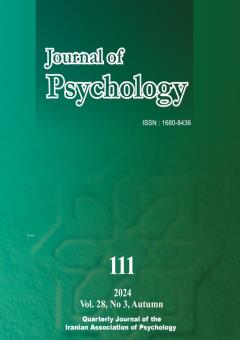Modeling the relationship between successful intelligence and cognitive flexibility with academic well-being, the mediating role of creative thinking in high school students
Subject Areas : روانشناسی تربیتی و تحولی
Nafiseh RAFIEE
1
![]() ,
Mojtaba Banitalebi
2
,
Mojtaba Banitalebi
2
1 - Department of educational sciences & Psychology, Payame Noor University, Tehran, Iran
2 - Department of Educational Psychology, Payam Noor University, Isfahan, Iran
Keywords: Academic well-being, successful intelligence, cognitive flexibility, creative thinking,
Abstract :
The aim of this study was to model the relationship between successful intelligence and cognitive flexibility with academic well-being, the mediating role of creative thinking in high school students. The present study was a descriptive-correlation of structural equations. The statistical population of the study included all male high school students in Shahrekord who were selected 327 people by stratified sampling method. The research instruments included Tominin-Sweeney et al.'s (2012) Academic weel being Questionnaire, Grigorenko & Sternberg (2002) Successful Intelligence Questionnaire, Dennis &Vander Wal (2010) Cognitive Flexibility Questionnaire, and Peter Hani's (2001) Creative Thinking Questionnaire. Data were analyzed at both descriptive and inferential levels using SPSS software version 23 and AMOS software version 22. The results showed that the model of the relationship between successful intelligence and cognitive acceptance flexibility with academic well-being with the mediating role of creative thinking has a good fit (RMSE = 0.07; GFI, TLI, RFI, NFI, IFI, PNFI and CFI indices were more than 0.90). The results of the hypotheses showed that there is a direct relationship between successful intelligence and academic well-being (α <0.05); There is a significant relationship between cognitive flexibility and academic well-being directly and indirectly (through creative thinking) (α <0.05); There is a significant relationship between creative thinking and academic well-being (α <0.05). Based on this, it can be said that the model of the relationship between successful intelligence and cognitive flexibility with academic well-being with the mediating role of creative thinking has a desirable fit.
امینی، ریحانه و صادقی، احمد. (1395). تاثیر آموزش هوش موفق بر بهزیستی و خودکارآمدی تحصیلی در دانش آموزان دختر. فصلنامه آموزش، مشاوره و روان درمانی، سال 5، شماره 18، 94-108.
جهاندوست دالنجان، سوسن، علاءالدینی، زهره، براتی، هاجر. (1399). نقش هوش موفق و همدلی عاطفی در رضایت زناشویی با در نظر گرفتن نقش تعدیلگر سن. فصلنامه فرهنگ مشاوره و روان درمانی، سال 11، شماره 41، 139-156.
حبیبی کلیبر، رامین. (1399). رابطه بین کنترل هدفمند، انعطاف پذیرش شناختی و پردازش هیجانی با عملکرد تحصیلی دانش آموزان. راهبردهای شناختی در یادگیری، سال 8، شماره 15، 183-204.
سواری، کریم. (1399). نقش واسطه خودکارآمدی تحصیلی، اجتماعی و هیجانی در رابطه بین انعطاف پذیری شناختی با بهزیستی روان شناختی. رویش روانشناسی، سال 9، شماره 5، 39-50.
مریدی، علی اصغر؛ و نوری مقدم، ثنا. (1401). مقایسه راهبردهای نظم جویی شناختی هیجان، بهوشیاری و انعطاف پذیری شناختی در دانش آموزان استعداد درخشان و عادی در دوران قرنطینه خانگی بیماری کووید 19. مجله مطالعات روانشناسی تربیتی، 19(45)، 104 – 87.
نیرومن، محدثه، و آقابابایی، سارا. (1398). بررسی رابطه بین خلاقیت و هوش عمومی با هوش موفق در دانش آموزان پایه پنجم و ششم دبستان شهر اصفهان. فصلنامه چشم انداز امین، دوره 7، ش 3، 77-87.
هاشمی، بهروز، غضنفری، احمد، شریفی، طیبه و احمدی، رضا. (1398). اثربخشی آموزش مولفه های هوش موفق برانگیزش پیشرفت تحصیلی دانشآموزان دختر. مجله مطالعات روانشناسی تربیتی. 16(36)، 203 – 189.
یعقوبی، ابوالقاسم، ذوقی پایدار، محمدرضا، فرهادی، مهران، یوسفی، بهنوش. (1399). پیشبینی بهزیستی تحصیلی بر اساس احساس تعلق به مدرسه و نشاط ذهنی با میانجیگری جهتگیری هدف در دانش آموزان. مجله روانشناسی مدرسه، 9(2)، 169-189.
Acar, S., Tadik, H., Myers, D., Sman, C., Uysal, R. (2020). Creativity and Well-being: A Meta-analysis. Journal of Creative Behavior,
Bilgin, M. (2017). Relations to five factor personality model with cognitive
flexibility in adolescents. Electronic Journal of Social Sciences, 16(62), 945-954.
Chen, X., He, J & Fan, F. (2019). Relationships between openness to experience, cognitive flexibility, self-esteem, and creativity among bilingual college students in the U.S., International Journal of Bilingual Education and Bilingualism, DOI: 10.1080/13670050.2019.1688247.
Demirtas, A.S. (2020). Cognitive Flexibility and Mental Well-Being in Turkish Adolescents: The Mediating Role of Academic, Social and Emotional Self-Efficacy. annals of psychology, 36(1), 111-121.
Fiorilli, C., De Stasio, S., Di Chiacchio, C., Pepe, A., and Salmela-Aro, K. (2017). School burnout, depressive symptoms and engagement: their combined effect on student achievement. Int. J. Educ. Res. 84, 1–12.
Greenstein, L. (2017). Accessing 21 century skills: To guide to evaluating mastery and authentic learning. USA: Corwin.
Kiuru, N., Wang, M. T., Salmela-Aro, K., Kannas, L., Ahonen, T., & Hirvonen, R. (2020). Associations between adolescents’ interpersonal relationships, school well-being, and academic achievement during educational transitions. Journal of youth and adolescence, 49(5), 1057-1072
Mandelman, S.D., Barbot, B., Grigorenko, E.L. (2016). Predicting academic performance and trajectories from a measure of successful intelligence. Learning and Individual Differences, 51:387-393.
Ramberg, J., Laftman, S.B., Akerstedt, T., Modin, B. (2020). Teacher Stress and Students’ School Well-being: the Case of Upper Secondary Schools in Stockholm. Scandinavian Journal of Educational Research, 64(6), 816-830.
Sternberg, R. J. (2020). The augmented theory of successful intelligence. In R. J. Sternberg (Ed.), The Cambridge handbook of intelligence (pp. 679–708). Cambridge University Press.
Valple, S., Sawhney, S. (2017). Relationship between Academic Achievement and Successful Intelligence of Adolescents. Educational Quest: An Int. J. of Education and Applied Social Scienc, 8(3), 799-805.
Widlud, A., Tuminen, H., Korhnen, J. (2018). Academic Well-Being, Mathematics Performance, and Educational Aspirations in Lower Secondary Education: Changes Within a School Year. Frontiers in Psychology.
Zubaidah, S., Fuad, N.F., Mahanal, S., Suarsini, E. (2017). Improving Creative Thinking Skills of Students through Differentiated Science Inquiry Integrated with Mind Map. Journal of Turkish Science Education, 14(4), 77-91.
Zuo, B., Wen, F., Wang, M., Wang, Y. (2019). The Mediating Role of Cognitive Flexibility in the Influence of Counter-Stereotypes on Creativity. Frontiers in Psychology,


